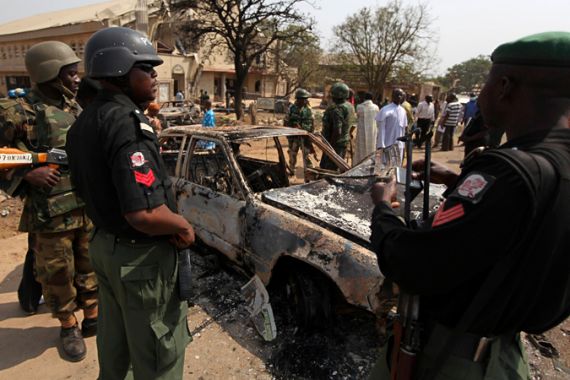Nigeria to change tactics against Boko Haram
Interior minister pleges to secure “the lives of Nigerians” after deadly Christmas bombings by Islamist group.

Nigeria’s government will change its tactics in a bid to bring the cycle of violence under control, the country’s interior minister has told Al Jazeera.
Abba Moro, Nigeria’s interior minister, says the government intends to change its tactics in dealing with the Islamist sect Boko Haram, after the church bombings that killed 39 people on Christmas Day.
Keep reading
list of 4 itemsPalestinian Prisoner’s Day: How many are still in Israeli detention?
‘Mama we’re dying’: Only able to hear her kids in Gaza in their final days
Europe pledges to boost aid to Sudan on unwelcome war anniversary
Boko Haram has claimed responsibility for Sunday’s attacks, which included bomb explosions at two churches and a suicide attack in the northeast.
“I think strategising to curb the excesses of this sectarian group is not necessarily an issue of negotiations. What I mean is this government will change tactics to secure the lives of Nigerians,” Moro said on Monday.
Al Jazeera’s Ahmed Idris, reporting from Abuja, said security had been stepped up in the capital and in many other places, but Nigerians still had doubts about the ability of the government to deal with the situation.
“[Many Nigerians] feel that the security agencies are not up to the task. A lot of people are calling for a review of the security strategy and the security apparatus of government in the country,” he said.
“The government promised to do its best to handle the situation, but so far this has not reassured Nigerians that everything is under control.”
Protection demanded
Women returned to clean the blood from the scene of the first attack, the St Theresa Catholic Church in Madalla, a satellite town of Abuja, on Monday.
One man wept uncontrollably amid its debris as a Nigerian Christian association demanded protection for its churches.
Crowds gathered among the burnt-out cars in the church’s dirt parking lot, angry over the attack and fearful that the group will target more of their places of worship.
Hundreds of residents sought to flee the violence-torn city of Damaturu, fearing further attacks and clashes between Islamists and the police, while about 30 Christian shops were burnt in the nearby city of Potiskum late on Sunday, the APF news agency reported.
Boko Haram has carried out increasingly sophisticated and bloody attacks in its campaign to implement strict Islamic law across Nigeria.
The group, whose name means “Western education is sacrilege” in the local Hausa language, is responsible for at least 504 killings in 2011 alone, according to the AP news agency.
Abul Qaqa, a Boko Haram spokesperson, claimed responsibility for the bombings in a statement to a journalists’ association in Maiduguri, capital of the group’s heartland.
Goodluck Jonathan, the Nigerian president, speaking in Abuja on Sunday, denounced the church attacks, saying: “There is no reason for these kind of dastardly acts.”
Analysts say political considerations may have played a part in the government’s thus-far muted response: Jonathan, a Christian from the south, may be hesitant to use force in the nation’s predominantly Muslim north.
“The violence is increasing both in scale and sophistication,” Shehu Sani, northern-based human rights activist, said.
“The attack on churches is [likely] to nationalise the crisis. It will instigate hitherto neutral people into the crisis.”
As a result, he said, Christians may try to take revenge on Muslims. “This is dangerous for the country,” Sani said.